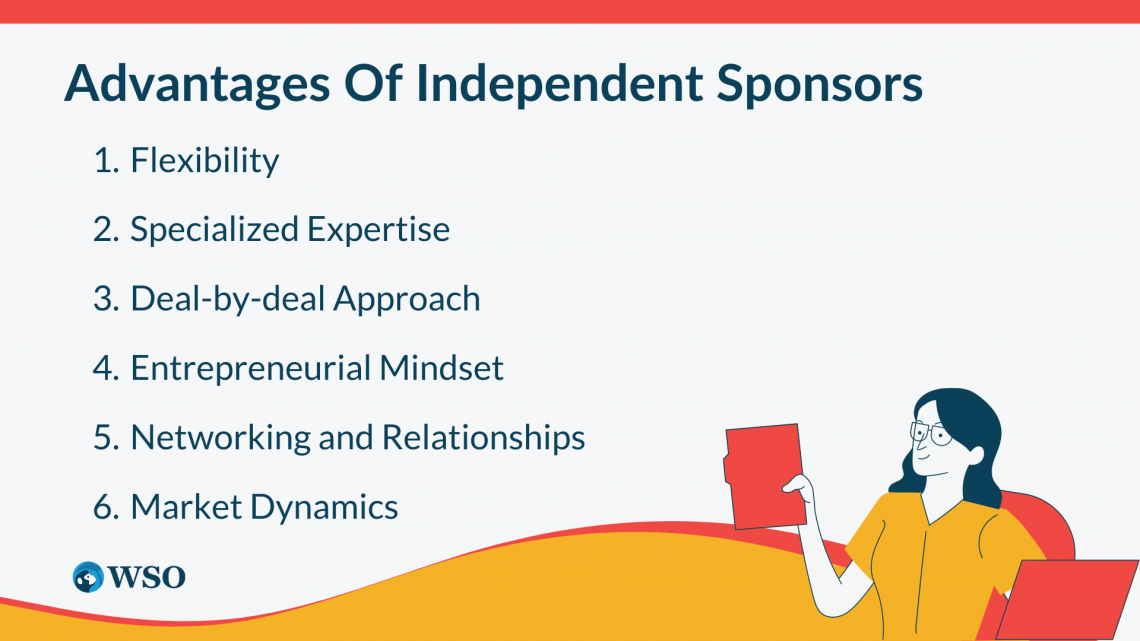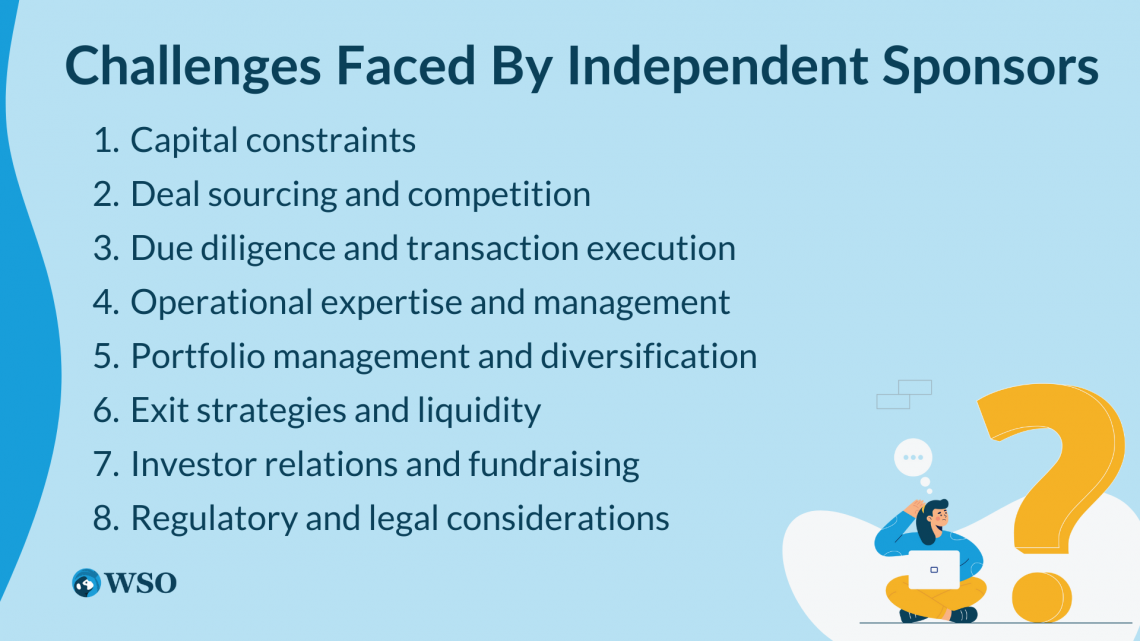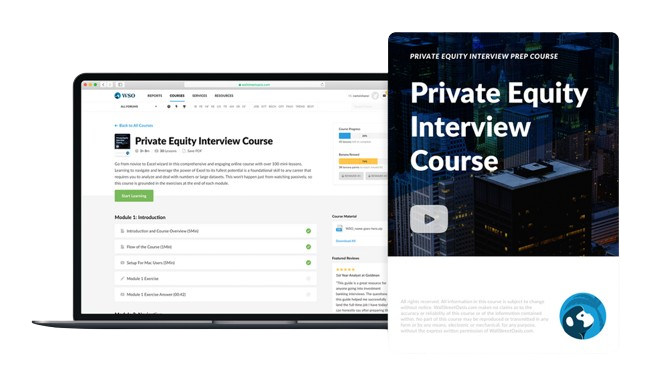Independent Sponsor
An independent sponsor is a private equity professional who sources and manages investments without a dedicated fund
An independent sponsor is also known as a fundless sponsor or Pledge Fund. It can be an individual or a group of people who want to purchase a company but need more money for it.

Instead, these individuals find a company they want to purchase and then look for someone to invest the money needed to buy it.
This way, they don't use a private equity fund like a pension or family fund but invest directly in the project. They run the organization, receive a percentage of the ownership and costs, and share the income with the investors.
They are usually experts in private equity or investment banking. They want to own part of a company and be involved in its growth and operations. The money they use usually comes from hedge funds, private equity firms, friends and family, or family offices.
The choice of where the money comes from depends on the deal size. For more significant deals, they need reputable private equity firms with ready money because they can help close the deal and provide someone to manage the company's operations.
Smaller values may only need money from family offices. In these cases, the independent sponsor can handle the deal and take on the operational role.
Key Takeaways
- Independent sponsors are individuals or groups who want to buy a company but need more money upfront.
- They find a company they want to purchase and then look for investors who can provide the necessary funds.
- They operate without using a private equity fund like a pension or family fund.
- They directly invest in the project and take on the responsibility of running the company.
- They receive a share of ownership, fees, and profits from the company.
- They generally specialize in private equity or investment banking and want to be actively involved in the company's growth and operations.
- The capital for independent sponsors can come from sources like hedge funds, private equity firms, friends and family, or family offices.
- Reputable private equity firms with ready money are often involved in larger deals to help close the transaction and provide operational support.
- Smaller deals may only require participation from family offices, where the independent sponsor handles both deal and operational management.
History of Independent Sponsors
Independent sponsors, also known as fundless sponsors or solo capitalists, are individuals or small groups who invest in and acquire companies without a committed pool of capital like traditional private equity firms.

They emerged as a distinct group in the private equity landscape in the late 20th century. The history of fundless sponsors can be tracеd back to thе risе of leveraged buyouts (LBOs) in the 1970s and 1980s.
During this period, private equity firms became popular by acquiring companies using a combination of equity and debt financing. However, traditional private equity funds had limited capital and could only pursue a few investment opportunities at a time.
Solo capitalists entered the scene to address this gap. These individuals or groups leveraged their industry expertise and personal networks to identify attractive investment opportunities.
Instead of raising a dedicated fund, they sought capital from individual investors, family offices, or other sources on a deal-by-deal basis. This approach allowed them to be more flexible and target a wider range of investments.
The role of solo capitalists grew in the 1990s and early 2000s as more investors recognized their advantages. Independent sponsors offered unique benefits, such as:
- The ability to move quickly on deals
- More personalized attention to portfolio companies
- A closer alignment of interests with investors due to the deal-by-deal structure

Over time, they established themselves as a recognized and viable alternative to traditional private equity funds. They proved their value by successfully acquiring and growing companies across various industries.
They have become more specialized, focusing on specific industries or types of transactions. Additionally, they have developed strong networks and relationships with capital providers, enabling them to access capital more efficiently.
The history of independent sponsors showcases their ability to adapt and thrive in the ever-changing private equity landscape.
Their flexible and agile approach has allowed them to carve out a distinct niche in the industry, providing alternative investment opportunities and generating value for investors and portfolio companies alike.
Advantages of Independent Sponsors
It can be attributed to several factors. In simple terms, they are individuals or firms that acquire and manage companies without having dedicated investment funds. Here are a few reasons for their increasing popularity.

1. Flexibility
They have the freedom to structure unique deals, tailoring them to specific circumstances and goals. This flexibility attracts investors and business owners as they can pursue opportunities outside the traditional investment criteria of institutional investors.
2. Specialized Expertise
They offer valuable industry knowledge and operational expertise gained through experience, enabling them to identify growth opportunities and effectively manage acquired companies.
Their specialized skills make them appealing to investors and business owners seeking sector-specific insights and guidance.
3. Deal-by-deal Approach
They raise capital on a deal-by-deal basis, unlike traditional private equity firms. This approach lets them focus on specific opportunities and adapt their investment strategy accordingly.
NOTE
Investors gain more control over their capital allocation by selecting specific investments.
4. Entrepreneurial Mindset
They have an entrepreneurial mindset, actively involved in managing and growing acquired companies.
They work closely with management teams, implementing strategies to drive value and enhance performance. This appeals to business owners who value the guidance of experienced operators.
5. Networking and Relationships
They develop wide networks with investors, lenders, industry experts, and key stakeholders, aiding them in sourcing deals, securing funding, and accessing valuable resources for their acquired companies.
NOTE
Having a broad network is advantageous for successfully executing transactions.
The changing private equity and M&A markets have led to the rise of independent sponsors. Increased competition, demand for specialized strategies, and more business owners seeking alternative exits have created opportunities for independent sponsors to offer unique solutions.
These factors have made them an appealing option for investors and business owners looking for tailored investment strategies and hands-on management expertise.
Challenges Faced by Independent Sponsors
Challenges and considerations faced by independent sponsors include

1. Capital constraints
They may face challenges raising sufficient capital for deals, as they typically raise funds on a deal-by-deal basis. Limited access to capital compared to traditional private equity firms can restrict their ability to compete for larger transactions.
2. Deal sourcing and competition
Finding attractive investment opportunities can be a challenge for pledge funds. They need to build strong networks, establish relationships, and actively search for deals to stay competitive amidst increased competition from other buyers.
3. Due diligence and transaction execution
They often have smaller teams and resources compared to larger private equity firms. Conducting thorough due diligence on potential investments and effectively executing transactions can be demanding, requiring efficient allocation of limited resources.
4. Operational expertise and management
They are typically involved in the operational aspects of the acquired companies.
NOTE
Ensuring they have the necessary expertise, management capabilities, and resources to drive growth and create value can be a critical consideration.
5. Portfolio management and diversification
As Fundless Sponsors typically focus on a small number of investments, portfolio management, and diversification become important. Balancing risk and return across a concentrated portfolio requires careful consideration and strategic decision-making.
6. Exit strategies and liquidity
Identifying and executing successful exit strategies is crucial for fundless sponsors to realize returns for their investors.
NOTE
The ability to sell or take companies public at favorable valuations and timing can impact overall investment performance.
7. Investor relations and fundraising
They need to maintain strong relationships with their investors, provide regular updates, manage expectations, and demonstrate successful track records to attract future funding for new deals.
8. Regulatory and legal considerations
They must navigate relevant regulatory and legal frameworks, ensuring compliance with securities laws, antitrust regulations, and other applicable rules during the investment process.
Successful navigation of these considerations contributes to their long-term viability and success in the market
Future Outlook and Trends of the Independent Sponsor Industry
The fundless sponsor industry is poised for continued growth and evolution, with several emerging trends and developments shaping its future. Here's a look at the potential outlook and key trends:

1. Increasing Popularity
This model is gaining traction as more entrepreneurs and investors recognize the benefits it offers, such as flexibility, tailored solutions, and specialized expertise. This growing popularity is expected to fuel the expansion of the independent sponsor industry.
2. Market Consolidation
As the industry matures, there may be a trend toward consolidation, with larger fundless sponsor firms acquiring smaller players or forming strategic partnerships.
This consolidation could lead to increased resources, broader networks, and enhanced capabilities within the independent sponsor ecosystem.
3. Global Expansion
They are increasingly exploring opportunities beyond domestic markets. With globalization and advancements in technology, they can identify and capitalize on cross-border investment prospects, expanding their reach and diversifying their portfolios.
4. Sector Focus and Specialization
They are likely to refine their sector focus and niche specializations further.
NOTE
By concentrating on specific industries or investment strategies, independent sponsors can deepen their expertise and differentiate themselves in the market, attracting entrepreneurs and investors seeking specialized knowledge and targeted solutions.
5. ESG Integration
Environmental, Social, and Governance (ESG) factors are gaining prominence in the investment landscape.
They are expected to place greater emphasis on ESG considerations in their investment strategies, aligning with the growing demand for sustainable and responsible investments.
6. Technology-driven Solutions
Technology-driven solutions, such as data analytics, artificial intelligence, and automation, are likely to become more prevalent in the fundless sponsor industry.
These tools can enhance deal sourcing, due diligence processes, and operational efficiency, enabling pledge funds to make informed decisions and drive value creation.
7. Co-investment Opportunities
They may increasingly explore co-investment opportunities, allowing them to partner with limited partners (LPs) or other investors to share risks and leverage additional capital.
NOTE
Co-investment arrangements can provide access to larger deals and enable pledge funds to deploy funds more efficiently.
8. Focus on Diversity and Inclusion
Diversity and inclusion are increasingly recognized in the investment industry. Fundless sponsors may prioritize efforts to enhance diversity within their teams and portfolios, recognizing the value of diverse perspectives and experiences in driving innovation and performance.
9. Regulatory Environment
The regulatory landscape for fundless sponsors may evolve, with potential changes in compliance requirements and reporting standards. Fundless sponsors will need to stay abreast of regulatory developments and ensure adherence to applicable rules and regulations.
10. Entrepreneurial Ecosystem Support
They can contribute to the broader entrepreneurial ecosystem by providing mentorship, resources, and support to emerging businesses.
NOTE
Their involvement in nurturing and guiding entrepreneurs can further strengthen their position as valuable partners in the investment ecosystem. As the independent sponsor industry continues to evolve, these trends and developments are expected to shape its future trajectory.
By staying agile, adaptable, and responsive to market dynamics, fundless sponsors can seize opportunities, navigate challenges, and contribute to the growth and success of the businesses they invest in.
Conclusion
In conclusion, they have emerged as a flexible and dynamic alternative to traditional private equity firms. With their specialized expertise, industry knowledge, and personalized approach, they offer tailored solutions to entrepreneurs and investors.

They bring valuable insights, operational experience, and extensive networks, driving growth and creating value in the companies they invest in.
The rise of independent sponsors reflects the increasing recognition of their unique advantages, including faster decision-making, alignment of interests, and the ability to secure diverse sources of funding.
Their independence allows them to pursue opportunities and make decisions based on the specific needs of each investment.
Accordingly, in the coming years, the fundless sponsor industry is expected to continue growing, with trends such as market consolidation, global expansion, and integration of ESG considerations shaping its evolution.
NOTE
Adopting technology-driven solutions focused on diversity and inclusion and supporting the broader entrepreneurial ecosystem is also anticipated.
Ultimately, pledge funds provide a valuable option for entrepreneurs seeking capital and support, as well as investors looking for customized investment opportunities.
Their expertise, personalized attention, and partnership-oriented approach contribute to the success and growth of the companies they invest in, making them a significant force in the evolving investment landscape.




or Want to Sign up with your social account?